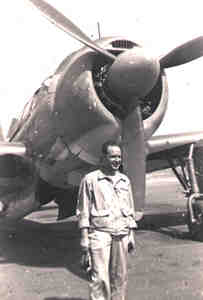|
|
||||||||||||||||||||||||
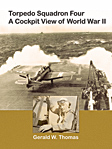 |
||||||||||||||||||||||||
|
|
||||||||||||||||||||||||
|
||||||||||||||||||||||||
|
|
||||||||||||||||||||||||
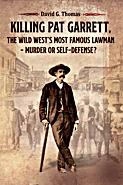 |
||||||||||||||||||||||||
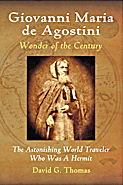 |
||||||||||||||||||||||||
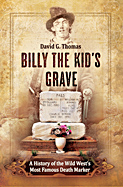 |
||||||||||||||||||||||||
|
|
||||||||||||||||||||||||
|
|
|
|
Dondero and Knozek Bail-Out Over Manila Harbor |
|
Early in the morning of November 14, 1944, the USS Bunker Hill launched an Air Group 4 strike group to attack Japanese shipping in South Manila Harbor. The strike group rendezvoused at 0753 and proceeded to the target at 10,000 feet with an Indicated Air Speed (IAS) of 135-140 knots. Commander George O. (Otto) Klinsmann, serving as the Air Group Commander, led the flight of 8 F6F "Hellcats," 20 SB2C "Helldivers," and 12 TBM "Avengers. A fairly complete report on the strike is given in Cavite and Manila Harbor in Torpedo Squadron Four: A Cockpit View of World War II. The VB-4 tactical organization for this strike over Manila was as follows. |
|
|
As the flight approached Manila Harbor, the dive bombers climbed to 11,500 feet. They flew over Laguna de Bay and approached the target from the Southeast. "The SB2C-3s dived out of the sun and released at 2,000 feet." |
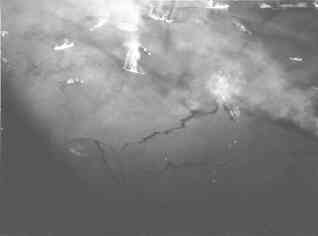 |
|||
|
Air Group 4 strike on shipping in Manila Harbor. |
|||
|
Further details of the dive bomber strike are quoted below from the Naval Archives: |
|
A direct hit on an AK was reported by two radiomen. It is believed the ship was #11 in the chart. Since it has not been possible to determine who attacked the ship, it is considered probable that Dondero scored the hit. McCauley, flying with VB-20, was advised by his section leader that his bombs hit an AK, #2 on the chart. DD, #1 on the chart, was seen to explode during the attack. Also it was reported that the Hatori class cruiser, #5 on the chart, and the Terutsuki class DD, #6 on the chart, appeared to have been damaged following the attack. Dondero reported to division leader McReynolds that he had been hit by A/A. A fighter pilot of VF-20 observed two persons bail out of an SB2C-3 at 1,200 feet over the bay. He stated that they hit the water between South Manila Harbor and Cavite. McReynolds saw one person in a rubber boat and one in a life jacket in this area. It is believed that they were Dondero and Knozek. |
|
In a tape recorded interview with Gerald Thomas, made on August 11, 1990, Don Dondero gave the following account of his bail-out and eventual return to the States. GWT: Don, you were shot down over Manila. Can you give me the details?
DD: It was early morning. As the dive bombers reached the target we got directions from the attack controller. He sent us in on some merchant ships. I was about half-way down in the dive when I got hit. GWT: Where was the plane hit? DD: I got hit in the wing. I think I also took a hit in the engine. But I continued the attack, dropped my bomb and pulled out over the bay. I thought, "I've got to figure this thing out. If I'm seriously damaged I'll go for the rescue sub and if I'm not I'll try to make it back to the ship." The A/A had gone through a gas tank on the side and there was a little flame burning in the wind. I figured if I slowed down, that fire would get heavier. The cockpit was getting hot and I smelled burning. Something hot hit me in the cheek so I called Chester on the radio and said, "It's getting too hot in here, let's get out." I looked back and his chute was trailing. He must have been sitting back there with his foot on the edge. He got out in a hurry! I stood up in the cockpit and looked back. I remember looking back at the tail. I thought that the tail was going to hit me right in the middle. Then I remembered all the instructions. You are supposed to stand up and dive toward the wing. You remember the routine they gave us? Well, I unhooked my headset and seat belt. As I stood up I was gone! I didn't have to dive toward anything because the air stream flipped me right out of the cockpit. I pulled the ripcord and it didn't seem like the parachute was coming out fast enough. The chute had caught on the seat for a while but it finally opened. I beat Chester to the water. GWT: So you dropped quite a while before the chute opened? What was your gunner's name? DD: Chester Knozek. Another thing they told us, "Unbuckle your chute straps before you hit the water." I always wore my straps real easy because on long hauls my back would hurt. I'm still falling fast. I'm looking at the water coming up at me. I decided then to inflate my Mae West. I didn't want to go 50 feet in the water and have to paddle up. It was no problem. My Mae West opened and there was plenty of room for the straps. We were told that the parachute, on a calm day, would fall right on top of you and you'd suffocate. Well, that didn't happen. The parachute fell over sideways. I unhooked the parachute and it sank. Now I'm looking for Chester who is maybe a couple of blocks away. I paddle over to him and then I got my seat pack out and opened the rubber boat. Chester and I sat in that one-man raft for quite a while. The first night we were still in Manila Bay. Just before dark I saw one of those curved fins of a shark go by. I thought, "God damn this has gotta be a dream. This can't be happening to me." But, I guess the sharks weren't very hungry because they had plenty of Japanese to eat from the boats that we sank. This was something to think about--a guy from Carson City, Nevada in a rubber boat in Manila Bay. So we spent the first night. We couldn't tell what was happening, but we tried to row away from a star. We wanted to get out of Manila Bay because there were too many Japanese there. The second day we kept rowing and when we passed Corregidor we thought the Japanese would see us but apparently nobody was watching--or gave a damn. We got out of the harbor without any problem. GWT: You had the little short paddle that went with the one-man boat. How did you make any progress? DD: It was kind of futile. What was happening was we were going with the current. But I didn't know that. Nobody told me about tides and currents. The biggest body of water I knew was Lake Tahoe. As luck would have it we made it out of the harbor and were heading down the China Sea towards another island which didn't look too far away. It was called Forton Island, we later found out from the Filipinos. It was a small uninhabited island. We found out later there was no water. We continued paddling and were getting tired. We didn't have much water. Those cans were about half full so we'd take a sip when we absolutely needed it. A fish of some sort came up. We pulled the tarp over us with the blue side showing so nobody would see us from the air. We were going to sleep. In the night I heard something that sounded like a kid rubbing his fingers against a balloon. I looked over the side and here's this 2 ½ feet wide, broad back of a fish. So I hit it with my fist. The fish tore some holes in our raft. We had a little repair kit but the holes were too long, so there was nothing we could do. So the raft goes down. GWT: But you don't think it was a shark? DD: No, I don't think so. It was dark brown. The Filipinos later told us there was some kind of fish that sees you out there and tries to push you towards shore. Well, that was a bad break. I don't know how far we were from shore, but we swam all afternoon and into the night. I took my gun off because it made me sore. You could get sore every place. Even my pants rubbing against my leg made sore spots. The first day and the first night we were in Manila Bay. The second day and the second night we floated South. GWT: You were getting food from a survival kit that you had with you? DD: We weren't hungry if you could believe that. One thing that happened in Manila Bay, right after we got shot down, you could see the Japanese had put out small boats coming to get us and then our fighters had come down and strafed them. They tried that 3 times and then they quit. Then we tried to hide the raft. There was seaweed coming to the surface from the attacks. We pulled this seaweed up over the raft, which I thought was pretty intelligent. Maybe an hour after we'd pulled the seaweed, I looked up and there's a snake crawling out of the seaweed. So I tucked my pants into my socks and we continued on. Anyway, we swam all afternoon and into the night. We had our Mae Wests on. So it wasn't a matter of sink or swim. But we still wanted to make the beach. It was dark and by now I'm seeing things. It was really weird. It looked like a lattice work of searchlights on the beach where we were going. As we got close to land, we stayed quiet. There could be a Japanese camp on the shore. We went ashore separately. I swam up to the beach and pulled the water out of my shoes. Then I buried my Mae West. But before I went to sleep I find myself talking to guys from the Squadron. I'm out of my skull. The guys are saying the BOQ's up on the hill. It hasn't been finished yet, but it's OK--you can get by. Anyway, I'm exhausted, so I go to sleep. I wake up the next morning on a tropical beach. There isn't a soul around. And Chester isn't there. It was kind of an inlet. I walked all the way around to a rocky point that I couldn't get past. I couldn't find Chester any place. I'm thirsty. I go up a hill. The briefings said to go to the high ground and look around to see the lay of the land. At the top of the hill, I looked around and there were just more hills. There was no water--there was a creek bed, but no water. In the survival book it says go well above the high water line and dig until you get water. They said it might be brackish, but it's OK, you can drink it. Well, I did that and I drank some. It really hit the spot but I threw up. The second time I threw up again I figured I just couldn't handle it. Then I threw up some blood so I gave up that source of water. I slept the next night. It wasn't very cold. Early the next morning just after dawn I could just barely see a Filipino boat as it went by the Island. We had been told that most of the Filipinos were friendly to Americans. I went down to the beach. I'm desperate. I yelled, "Hey, Filipinos!" They just continued going by and out of sight. Now I thought the whole Japanese army would be in here to get me. But the Filipinos flipped a "U" and came back by and pulled in to shore. By now I'm afraid. They landed and I backed up. I found a club That's the only weapon I had. They said, "Americano?" They were friendly! So I went down to the boat. I gave them my wristwatch which was half-full of water. I think I had 80 cents on me which I also gave them. I said, "Do you have any water?" They had some green coconuts. They chopped the top off the coconuts and let me drink the coconut milk. That was the greatest thing I ever tasted. I went down with the Filipinos to their village. Then I got with other guerilla organizations. We walked mainly at night and slept in the daytime, like hiding at the far end of a field or in a chicken coop. We'd sleep in the chicken coop. The funny thing about chickens, they don't like anybody in their coop. The chickens would walk around crowing and clucking and then we couldn't sleep. We worked our way down toward Lingayan. There we picked up a coconut boat and went to Mindoro. On that trip it was darker than hell. We heard a motor of a Japanese patrol boat. They told us if any of the Japanese came aboard to get out of sight and into the hold under the coconuts. They'd cover us up. But I was sleeping when I first heard this motor. I'm up and ready to go over the side! They stopped me. But apparently the boat didn't see us or didn't get us on their radar. We continued on to Mindoro where there was an American weather station. There were two sergeants who ran the weather station. They had a radio. There was an American Lieutenant Commander who ran an intelligence station called [unidentified] on the North end of Mindoro. It was pretty comfortable. We had guns and plenty to eat. The food wasn't really great, but this Lieutenant Commander liked to play bridge. By now I'm with some other guys from other squadrons every night. He had the key to the food locker, so if we played bridge with the Commander, he'd give us some hot chocolate. I hated bridge. I didn't know much about it. He had a lot of descriptive terms about the way I played. I knew damn well if I hung on long enough I'd get some hot chocolate. You know, little nothing deals, but those are the things that happened. We'd scoop a hole in the sand and catch those little sand crabs. We'd race those crabs for cigarettes. We'd throw them all in the hole and then the first one out was the winner. The one thing about being shot down was, well, I thought it was a way to quit smoking. So the second thing these guys offered me was cigarettes. We called them tracer bullets. They were made out of book paper. They were rolled and the tobacco didn't taste too good, but it's funny what a guy will do to keep going. We stayed at Mindoro. Every day at 6 o'clock there was the Armed Forces news. We'd go over to the weather station with these two guys and listen to the news. Finally one day they said Allied Forces had invaded Mindoro. But it was at the South end. We were at the North end. They had radioed to these guys. They had daily contact because the weather station would send up a balloon, take readings, and radio the information they had. So they radioed that we were all there. They gave our names. There was another guy from a dive bomber, a gunner from another carrier, a tall fighter pilot, a chief, and a sergeant who escaped from Corregidor. That was our group. The fighter pilot said when he got shot down he ditched his plane. His last message to the guys was that he was real sorry he didn't have a screwdriver so he could get the clock out of the plane. Remember, the clocks were great souvenirs? GWT: How did you finally get back? Did you ever rejoin your squadron? DD: No I never did. What happened, when the Americans reached the South end of Mindoro, they sent a couple of PT boats to get us. On the first night, the PT boats came into the little harbor and there was a Filipino coconut boat coming in. The PT boats picked that up and flipped a "U" and went back. We were really mad they didn't stay because we didn't get a chance to get with them. They said they were loaded with press. We could have been world famous! The next night we got on another PT boat. We had one Japanese prisoner. He had made a forced landing on Mindoro and was caught. They brought him into the main office were we were. The head of the guerrillas said, "You want to kill him?" We had no inclination to kill the guy. He was a short, sullen looking little guy in a beautiful white suit the first time we saw him. Then the next day when we saw him he had only a loin cloth. Clothes were a real premium. I got the note that they sent in with him. It said, "Captain Dodson (he was the head of the guerrilla outfit) if you kill a Japanese please reserve his clothes for the man who captures him." I saved that note. It's on the back of a Filipino sugar factory invoice. We didn't want to kill the guy so we brought him back. About half way back the sun's coming up and this Japanese is inching towards the side. So somehow the guys on the PT boat dropped a radar dome on him. I guess it hit an arm. After that, he quit trying to get away. Another thing that happened on the way--we see one Japanese plane. He's tooling along and he spots us. We're dead! If he knows anything about strafing, he had us cold. What could a PT boat do? Our crew could shoot at him but I don't think they could get him because they were bouncing along at 40 miles an hour. The guy circled and he sent a couple of letters and these PT boat guys sent a couple of letters back on the blinker. It didn't work. So instead of coming in on the sunny side where we couldn't have seen him, he came in on the shady side. The Japanese plane made a perfect target and our gunners shot the guy down. He dropped one bomb which missed. I don't think it even detonated. Right after that exciting moment, I couldn't help but notice that I was shaking, because we knew how cold the guy had us. He must have been a green hand to get shot down so easy! A few minutes later some P-38s showed up. GWT: Still you're in a PT boat after the Japanese made a run on it? DD: Well, he made a run and dropped a light bomb and missed us. He didn't even open up with his guns. I don't know why the hell he didn't because those PT boats are made out of an inch and half of plywood. I thought, "Christ, that guy can sink us." But we shot him down. Two P-38s circled us as we went on to San Jose. That's it. We got back to the Americans at San Jose and had dinner with the General. Then we met one correspondent from the New York Herald Tribune. Homer Biggert was his name. We told him the story. GWT: Did he write anything on it? DD: Yes. The funny thing was the Navy didn't tell my parents I was shot down. But my cousin was stationed in New York. He's on a boat and this friend of his is reading the paper and says, "You got a cousin named Dondero?" They spelled my name wrong in the paper actually. But my cousin read it and he called my folks. They called Pat McCarren, who was a gunner from Nevada, so my parents got notice that I was OK. From there on it was easy. We had Filipino clothes when the Navy gave us dungarees. I borrowed 50 bucks from the Red Cross for shaving stuff. We had to travel the rest of the way to Hawaii in dungarees. We'd go into an Officer's Club even though we had one enlisted man with us. This isn't the guy you say "Hit the barracks, Charlie!" So we walk into an Officer's Club as soon as they are open while we're in transit to Hawaii. The bartender would say, "Sorry, I'm not allowed to serve anybody but officers here." We were in dungarees. We would say, "We're officers!" in a way that he knew we were serious. We didn't want any conversation. We just wanted a drink! I guess we stopped on Guam. The guys from the Squadron (Bombing 4) were on the other side of the island not far from where we landed at the airfield. But I never knew they were there so I missed them. Anyway, we went to Hawaii and on to San Francisco and Jacksonville where I finished up as a flight instructor. GWT: What happened to Knozek, your crewman, after you got separated in the Philippines? DD: He was picked up by a different guerrilla group. I looked him up in Hawaii. We were all checking through Com Air Pack when we first got back to get our records. So I might have found out from them where he was. But anyway, I got in touch with him and he was in good shape and good spirits. Happy to get the hell out. We spent some time together. Then I never saw him again until he looked me up in Jacksonville. Photo: Rescued Americans on Mindoro, Philippines after banana boat trip. |
|
|
Air Group 4 - "Casablanca to Tokyo" |
|||
|
|
|||
